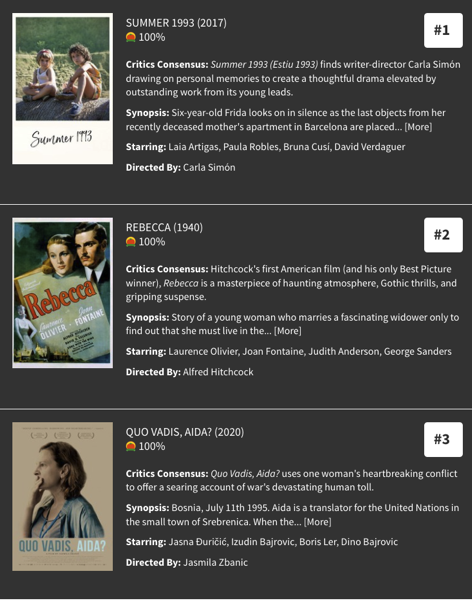 As a warm-up to the upcoming Oscar ceremony, the Women in Film DC podcast invited me in my position as Executive Director of the Stephens College MFA in TV and Screenwriting to a panel discussion about the women who have won Oscars from the beginning of the famed award ceremony. Having watched most of the ceremonies from the time I sat in front of the TV in my grandparents’ house cross-legged and begged to stay up past 11pm on a Sunday/school night, I had plenty of information. Then, as editor of When Women Wrote Hollywood I had the chance to talk about the many female screenwriters whose names aren’t well known, but who wrote or otherwise contributed to films from Queen Christina (Salka Viertel) to It’s a Wonderful Life (Frances Hackett) to The Piano (Jane Campion).
As a warm-up to the upcoming Oscar ceremony, the Women in Film DC podcast invited me in my position as Executive Director of the Stephens College MFA in TV and Screenwriting to a panel discussion about the women who have won Oscars from the beginning of the famed award ceremony. Having watched most of the ceremonies from the time I sat in front of the TV in my grandparents’ house cross-legged and begged to stay up past 11pm on a Sunday/school night, I had plenty of information. Then, as editor of When Women Wrote Hollywood I had the chance to talk about the many female screenwriters whose names aren’t well known, but who wrote or otherwise contributed to films from Queen Christina (Salka Viertel) to It’s a Wonderful Life (Frances Hackett) to The Piano (Jane Campion).
Podcast: Play in new window | Download
Subscribe: RSS
From Media & Monuments…
Topics that come up include women’s writers penchant for using their art for social justice, how the rise of the studio-as-factory system affected female employment, and how will streaming services change what films can be made – and can be nominated. I hope you enjoy the listen:
Ahead of the 94th Academy Awards on March 27, 2022, board member Sandra Abrams sits down with two amazing women to discuss Oscar’s history on nominations of women in non-actor categories. Our guests are Dr. Rosanne Welch, Executive Director of the MFA in TV and Screenwriting Program at Stephens College, and Leslie Combemale, a syndicated film critic known as Cinema Siren, and the creator and host of WomenRockingHollywood – an annual panel at Comic Con in San Diego which highlights female filmmakers. The women reflect on female representation throughout Hollywood’s and the awards show’s history, how it has changed, and what they see for the future.
Leslie Combemale: https://cinemasiren.com/ and https://lesliecombemale.com/ and https://womenrockinghollywood.com/


![16 More On Treva Silverman From Women in Early TV for the American Women Writers National Museum [Video]](https://rosannewelch.com/wp-content/uploads/2022/03/rmw-visible-stars-early-tv-16.jpg)


![41 Theme and Character...from Worry and Wonder | The Courier Thirteen Podcast [Video]](https://rosannewelch.com/wp-content/uploads/2022/03/rmw-courier-13-41.jpg)
![33 More on How To Change How We Teach History from Concord Days: Margaret Fuller in Italy [Video]](https://rosannewelch.com/wp-content/uploads/2022/03/rmw-concord-day-2021-fuller-rome-33.jpg)
![02 On The Imporatnce of Screenwriters from In Conversation with Dr. Rosanne Welch and Intellect Books [Video]](https://rosannewelch.com/wp-content/uploads/2022/03/rmw-intellect-02.jpg)

![15 Treva Silverman From Women in Early TV for the American Women Writers National Museum [Video]](https://rosannewelch.com/wp-content/uploads/2022/03/rmw-visible-stars-early-tv-15.jpg)

![40 Artist-Scholars from Worry and Wonder | The Courier Thirteen Podcast [Video]](https://rosannewelch.com/wp-content/uploads/2022/03/rmw-courier-13-40.jpg)
![32 Change How We Teach History from Concord Days: Margaret Fuller in Italy [Video]](https://rosannewelch.com/wp-content/uploads/2022/03/rmw-concord-day-2021-fuller-rome-32.jpg)
![01 Introduction and Stephens College MFA In TV and Screenwriting from In Conversation with Dr. Rosanne Welch and Intellect Books [Video]](https://rosannewelch.com/wp-content/uploads/2022/03/rmw-intellect-01-1-1200x675.jpg)
![01 Introduction and Stephens College MFA In TV and Screenwriting from In Conversation with Dr. Rosanne Welch and Intellect Books [Video]](https://rosannewelch.com/wp-content/uploads/2022/03/rmw-intellect-01.jpg)